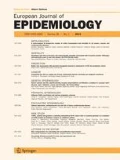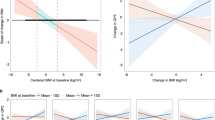Abstract
We examined the impact of school performance measured in terms of grade point averages (GPAs) in early and middle adolescence (ages 9, 12, and 15), and the impact of school performance throughout the different school stages on adult obesity. The participants were 732 healthy women and men derived from a population-based Cardiovascular Risk in Young Finns Study. GPAs were measured at the ages of 9, 12, and 15. The body mass index (BMI; kg/m²), and the waist circumference (WC) were conducted participants being aged 27 or 30. Birth weight, childhood BMI, adulthood physical activity, maternal and paternal BMI, and maternal education were controlled for. The results showed that low GPAs in each measurement and low GPAs throughout the comprehensive school were a risk factor of adulthood obesity, but only among women. The association remained when controlling for potential confounding variables (p-values in the fully adjusted models 0.026, 0.007, and 0.004 at the ages of 9, 12, and 15, respectively). The results were similar when the BMI was used as a dichotomous variable (BMI ≥ 30 and BMI < 30). Low school performance has previously been associated with higher rates of smoking and alcohol consumption later in life. Our result underscores that low school performance is a health risk factor that should be taken seriously in preventive health education.


Similar content being viewed by others
Abbreviations
- BMI:
-
Body mass index
- WC:
-
Waist circumference
References
Branca F, Nikogosian H, Lobstein T. (Eds.) The challenge of obesity in the WHO European Region and the strategies for response. Geneva: Switzerland, World Health Organisation (WHO), 2007, 339 pp. Retrieved in July 10, 2008, from World Health Organisation Reports Online. Available from: www.euro.who.int/document/E90711.pdf.
Caballero B. The global epidemic of obesity: an overview. Epidemiol Rev. 2007;29(1):1–5.
Berghöfer A, Pischon T, Reinhold T, Apovian CM, Sharma AM, Willich SN. Obesity prevalence from a European perspective: a systematic review. BMC Publ Health. 2008;8(200):1–10.
Helakorpi S, Prättälä R, Uutela A. Suomalaisen aikuisväestön terveyskäyttäytyminen ja terveys, kevät 2007 [Health behaviour and health among Finnish adult population, spring 2007]. Publications of the National Public Health Institute, Finland, 6/2008, 208 pp. Available from: http://www.ktl.fi/attachments/suomi/julkaisut/julkaisusarja_b/2008/2008b06.pdf.
Must A, Spadano J, Coakley EH, Field AE, Colditz G, Dietz WH. The disease burden associated with overweight and obesity. JAMA. 1999;282(16):1523–9.
Alexander JK. Obesity and coronary heart disease. Am J Med Sci. 2001;321(4):215–24.
Field AE, Coakley EH, Must A, Spadano JL, Laird N, Dietz WH, et al. Impact of overweight on the risk of developing common chronic diseases during a 10-year period. Arch Intern Med. 2001;161(13):1581–6.
McMillan DC, Sattar N, McArdle CS. ABC of obesity. Obesity and cancer. BMJ. 2006;333(7578):1109–11.
Pulkki-Råback L, Elovainio M, Kivimäki M, Raitakari OT, Keltikangas-Järvinen L. Temperament in childhood predicts body mass in adulthood: the cardiovascular risk in young finns study. Health Psych. 2005;24(3):307–15.
Roth J, Qiang X, Marbán SL, Redelt H, Lowell BC. The obesity pandemic: where have we been and where are we going? Obes Res. 2004;12(Suppl 2):S88–101.
Müller-Riemenschneider F, Reinhold T, Berghöfer A, Willich SN. Health-economic burden of obesity in Europe. Eur J Epidemiol. 2008;23(8):499–509.
Parsons TJ, Powers C, Logan S, Summerbell CD. Childhood predictors of adult obesity: a systematic review. Int J Obes Relat Metab Disord. 1999;23(Suppl 8):S1–107.
Heyneman SP. Student background and student achievement: what is the right question? Am J Educ. 2005;112(1):1–9.
Taras H, Potts-Datema W. Obesity and student performance at school. J Sch Health. 2005;75(8):291–5.
Mo-suwan L, Lebel L, Puetpaiboon A, Junjana C. School performance and weight status of children and young adolescents in a transitional society in Thailand. Int J Obes Relat Metab Disord. 1999;23(3):272–7.
Crosnoe R, Muller C. Body mass index, academic achievement, and school context: examining the educational experiences of adolescents at risk of obesity. J Health Soc Behav. 2004;45(5):393–407.
Datar A, Sturm R, Magnabosco JL. Childhood overweight and academic performance: national study of kindergartners and first-graders. Obes Res. 2004;12(1):58–68.
Datar A, Sturm R. Childhood overweight and elementary school outcomes. Int J Obes. 2006;30(9):1449–60.
Laitinen J, Power C, Ek E, Sovio U, Jarvelin MR. Unemployment and obesity among young adults in a northern Finland 1966 birth cohort. Int J Obes Relat Metab Disord. 2002;26(10):1329–38.
Shore SM, Sachs ML, Lidicker JR, Brett SN, Wright AR, Libonati JR. Decreased scholastic achievement in overweight middle school students. Obesity. 2008;16(7):1535–8.
Sigfusdottir ID, Kristjansson AL, Allegrante JP. Health behaviour and academic achievement in Icelandic school children. Health Educ Res. 2007;22(1):70–80.
Mikkilä V, Lahti-Koski M, Pietinen P, Virtanen SM, Rimpelä M. Associates of obesity and weight dissatisfaction among Finnish adolescents. Public Health Nutr. 2003;6(1):49–56.
Bin X, Chih-Ping C, Spruijt-Metz D, Reynolds K, Clark F, Palmer PH, et al. Weight perception, academic performance, and psychological factors in Chinese adolescents. Am J Health Behav. 2006;30(2):115–24.
Huang TT, Goran MI, Spruijt-Metz D. Associations of adiposity with measured and self-reported academic performance in early adolescence. Obesity. 2006;14(10):1839–45.
Cottrell LA, Northrup K, Wittberg R. The extended relationship between child cardiovascular risks and academic performance measures. Obesity. 2007;15(12):3170–7.
Judge S, Jahns L. Association of overweight with academic performance and social and behavioral problems: an update from the early childhood longitudinal study. J Sch Health. 2007;77(10):672–8.
Li X. A study of intelligence and personality in children with simple obesity. Int J Obes Relat Metab Disord. 1995;19(5):355–7.
Lahti-Koski M, Vartiainen E, Männistö S, Pietinen P. Age, education and occupation as determinants of trends in body mass index in Finland from 1982 to 1997. Int J Obes. 2000;24(12):1669–76.
Halkjaer J, Holst C, Sørensen TI. Intelligence test score and educational level in relation to BMI changes and obesity. Obes Res. 2003;11(10):1238–45.
Falkner NH, Neumark-Sztainer D, Story M, Jeffery RW, Beuhring T, Resnick MD. Social, educational, and psychological correlates of weight status in adolescents. Obes Res. 2001;9(1):32–42.
Schwimmer JB, Burwinkle TM, Varni JW. Health-related quality of life of severely obese children and adolescents. JAMA. 2003;289(14):1813–9.
Swallen KC, Reither EN, Haas SA, Meier AM. Overweight, obesity, and health-related quality of life among adolescents: the National Longitudinal Study of Adolescent. Health Pediatr. 2005;115(2):340–7.
Tershakovec AM, Weller SC, Gallagher PR. Obesity, school performance and behaviour of black, urban elementary school children. Int J Obes Relat Metab Disord. 1994;18(5):323–7.
Warschburger P. The unhappy obese child. Int J Obes. 2005;29(Suppl 2):S127–9.
Åkerblom HK, Uhari M, Pesonen E, Dahl M, Kaprio EA, Nuutinen EM, et al. Cardiovascular risk in young Finns. Ann Med. 1991;23(1):35–9.
National Institute of Health and Clinical Excellence (NHS) (2006) Obesity: the prevention, identification, assessment, and management of overweight and obesity in adults and children. Clinical Guideline 43. National Institute of Health and Clinical Excellence (NHS). London: UK. Retrieved July 10, 2008, from National Institute of Health and Clinical Excellence Online. Available from: http://www.nice.org.uk/nicemedia/pdf/CG43NICEGuideline.pdf.
Telama R, Yang X, Viikari J, Välimäki I, Wanne O, Raitakari O. Physical activity from childhood to adulthood: a 21-year tracking study. Am J Prev Med. 2005;28(3):267–73.
Morrill CM, Leach JN, Shreeve WC, Radebaugh MR. Teenage obesity: an academic issue. Int J Adolesc Youth. 1991;2(4):245–50.
Steinmayr R, Spinath B, Neubauer AC. Sex differences in school achievement: what are the roles of personality and achievement motivation? Eur J Person. 2008;22(3):185–209.
West P, Sweeting H. Fifteen, female and stressed: changing patterns of psychological distress over time. J Child Psychol Psychiatry Discipl. 2003;44(3):399–411.
Entwisle DR, Hayduk LA. Academic expectations and the school attainment of young children. Soc Educ. 1981;54(1):34–50.
Entwisle DR, Baker DP. Gender and young children’s expectations for performance in arithmetic. Dev Psychol. 1983;19(2):200–9.
Torres SJ, Nowson CA. Relationship between stress, eating behavior, and obesity. Nutrition. 2007;23(11):887–94.
Kuncel NR, Credé M, Thomas LL. The validity of self-reported grade point averages, class ranks, and test scores: a meta-analysis and review of the literature. Rev Educ Res. 2005;75(1):63–82.
Kokko K, Bergman LR, Pulkkinen L. Child personality characteristics and selection into long-term unemployment in Finnish and Swedish longitudinal samples. Int J Behav Dev. 2003;27(2):134–44.
Lynch JW, Kaplan GA, Salonen JT. Why do poor people behave poorly? Variation in adult health behaviours and psychosocial characteristics by stages of the socioeconomic lifecourse. Soc Sci Med. 1997;44(6):809–19.
Loh C, Rutledge T. Effect sizes and statistical testing in the determination of clinical significance in behavioral medicine research. Ann Behav Med. 2004;27(2):138–45.
Bryant AL, Schulenberg J, Bachman JG, O’Malley PM, Johnston LD. Understanding the links among school misbehavior, academic achievement, and cigarette use: a national panel study of adolescents. Prev Sci. 2000;1(2):71–87.
Huurre T, Lintonen T, Kaprio J, Pelkonen M, Marttunen M, Aro H. Adolescent risk factors for excessive alcohol use at age 32 years A 16-year prospective follow-up study. Soc Psychiatry Psychiatr Epidemiol. 2010;45(1):125–34.
Pitkänen T, Kokko K, Lyyra A, Pulkkinen L. A developmental approach to alcohol drinking behaviour in adulthood: a follow-up study from age 8 to age 42. Addiction. 2008;103(Suppl 1):48–68.
Acknowledgments
This study was supported by the Academy of Finland (grants 124399 for L.K.-J., and 123621 for L.P.-R.), The Research Funds of the University of Helsinki (L.P.-R.), Alfred Kordelin’s Foundation (S.A.), Oskar Öflund’s Foundation (S.A.), Signe and Ane Gyllenberg’s Foundation (L.K.-J., and M.H.), and Yrjö Jahnsson’s Foundation (M.H.).
Author information
Authors and Affiliations
Corresponding author
Rights and permissions
About this article
Cite this article
Alatupa, S., Pulkki-Råback, L., Hintsanen, M. et al. School performance as a predictor of adulthood obesity: a 21-year follow-up study. Eur J Epidemiol 25, 267–274 (2010). https://doi.org/10.1007/s10654-010-9428-6
Received:
Accepted:
Published:
Issue Date:
DOI: https://doi.org/10.1007/s10654-010-9428-6




